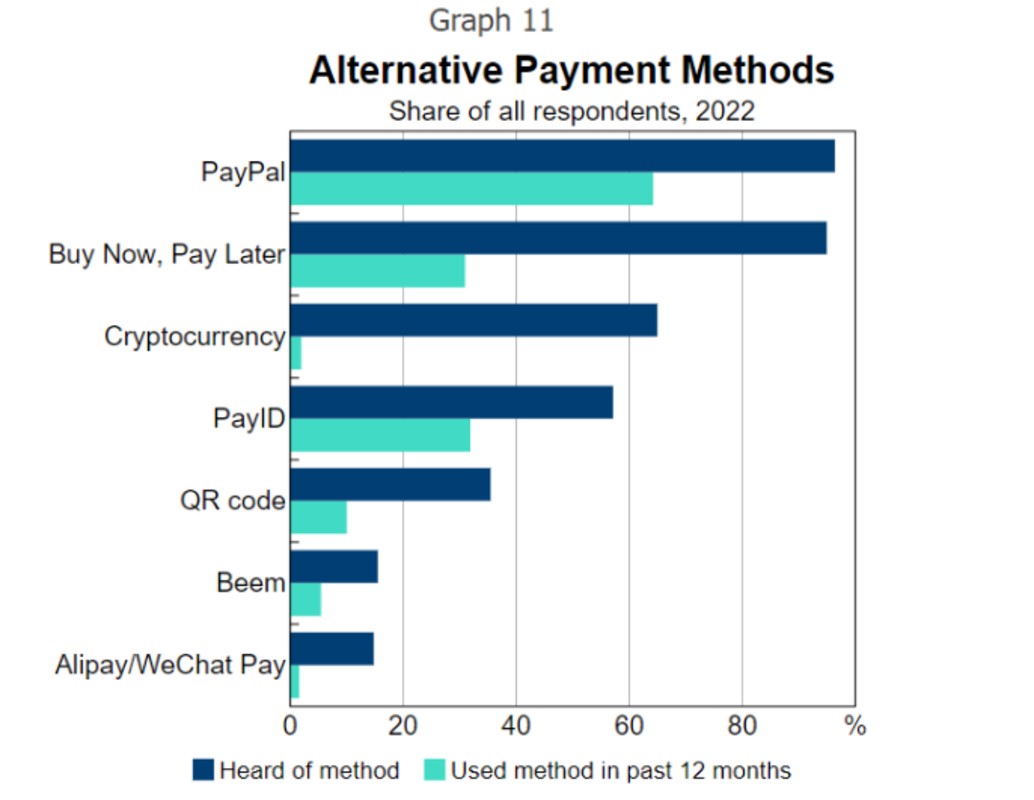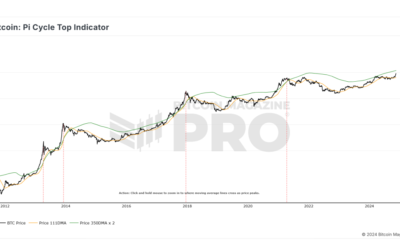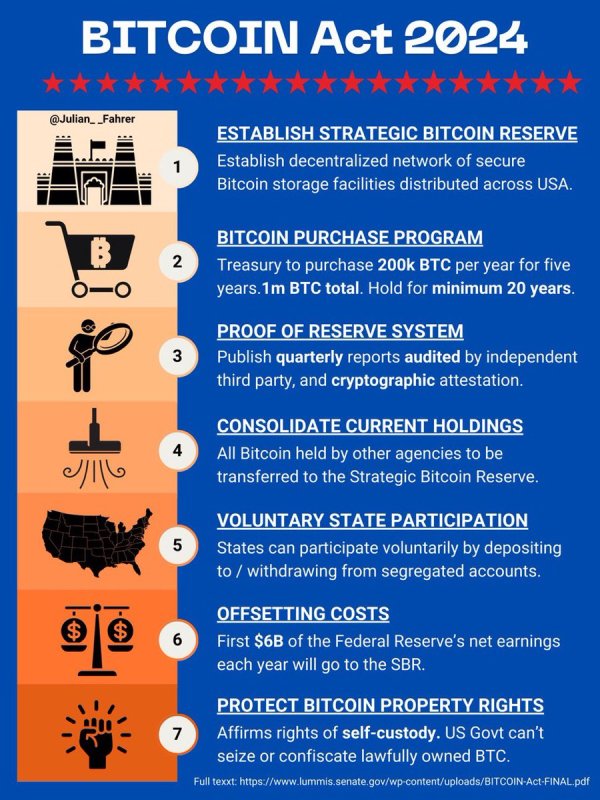Opinion
The Urgent Need for Bitcoin Tax Reform to Encourage Everyday Use
Published
2 months agoon
By
admin
The debt based monetary system has become quite extreme. On one hand, the US crossed the $35 trillion national debt milestone, placing a $104k burden on every US citizen. On the other hand, the Congressional Budget Office (CBO) puts federal expenditures for 2024 at 24.2% of GDP.
This divergence between profligate spending and debt ballooning puts the economy on a narrow path. It is exceedingly unlikely that USG would opt to reduce spending, most of which goes to social programs, entitlements and the military. The latter alone is the key ingredient that backs USD as world currency.
Conversely, this entails another Fed balance sheet expansion, with three 0.25% rate cuts this year already priced in. In turn, non-currency assets like equities, gold and Bitcoin are poised for growth yet again. At the root of this dynamic is the question of information validity.
Just as the US Bureau of Labor Statistics is expected to revise down job figures by up to one million between April 2023 and March 2024, the information corruption is visible with central banking itself. If the Federal Reserve can increase M2 money supply by 27% in 2020-21, the money itself loses informational coherence.
It is this why investors then seek equities, gold and Bitcoin. These assets become vehicles of value because currency loses its ability to reliably relay value. The problem is, they are also taxed as a way to subdue the velocity of exiting the central banking system.
This is especially pertinent for Bitcoin, a unique asset that is both a store of value but could be made as a daily transaction driver. The question then poses itself, is a legalistic landscape viable in which low-value Bitcoin transactions are exempt from federal taxation?
Bitcoin’s Usage and Currency Substitution Suitability
To understand the regulatory path forward, we first need to understand how Bitcoin is typically used. After all, contrasting Bitcoin usage against fiat usage paints a clearer picture if Bitcoin can be used as a practical currency, or if it will be perceived as a threat to the current monetary system.
Notwithstanding layer 2 scaling solutions such as Lightning Network, the more BTC is used the greater is the load on the Bitcoin mainnet as miners process transaction blocks. In turn, greater network activity generates greater friction, manifesting as escalating fees for each BTC transaction.
In a developed country like Australia, cryptocurrency usage for payments has been typically minimal.

Image credit: Reserve Bank of Australia
This is predictable as people need strong incentives to move away from existing payment solutions, ones that are already instantaneous and convenient.
At best, BTC transactions mostly revolve around third-parties facilitating BTC transactions using fiat currency. Case in point, Bitcoin onramp platform Strike had to ditch Prime Trust custodian as it eventually filed for bankruptcy. However, Strike still uses banks such as Lead, Cross River Bank, and Customers Bank.
In other words, Bitcoin adoption is attached to online payment systems, through commercial banks which are tied to central banks. The latter have already made money de facto digital, except it is hosted on their ledgers.
Although these institutions can tamper with the money supply, they can do so to facilitate maximum liquidity needed for a debt-based monetary system in which fiat currency is effectively a debt-tracker.
In contrast, Bitcoin’s scarcity makes it less appealing for such use. Gold already showcased this when it was abandoned. Because gold’s supply was not flexible enough to support a growing (debt-based) economy, mainstream economists viewed the gold-backed currency as outdated.
Moreover, Bitcoin is ill-suited as a daily currency driver against feeless alternatives like Nano (XNO) that boast eco-friendly green hosting or potential CBDCs. Rather, Bitcoin’s strength relies on inviolable scarcity, one that serves as a global reserve settlement layer.
While both of these factors, network friction and flexible liquidity, are making Bitcoin less suitable as a proper medium of exchange, it also makes Bitcoin less threatening to the system. But does that mean that Bitcoin’s tax treatment should be tweaked?
The Impact of Current Tax Policies on Bitcoin Usage
On exchanges and platforms like aforementioned Strike, users can freely buy Bitcoin without worrying it will be a taxable event. It only becomes so when BTC is sold for profit. Then, it is subject to capital gains tax for trading.
That’s because the Internal Revenue Service (IRS) designates Bitcoin as property. If Bitcoin is held less than a year before it is sold, holders are subject to ordinary income tax rate ranging from 10% to 37%.
Holding Bitcoin over one year makes it subject to 0% – 20% tax rate, depending on the income level spread across three brackets – 0%, 15% and 20%. In turn, Bitcoin holders have to keep a track of when they bought BTC, at which price, and when they sold it, at which price. The profit difference is taxed as capital gains.
Likewise, swapping Bitcoin for another cryptocurrency is a taxable event, subject to capital gains tax. If BTC is received as payment/earnings, or from mining/staking/airdrops, it is then treated as wages income tax, falling into the 10% – 37% ordinary income tax range.
Alongside buying BTC, holding it or donating it to a registered non-profit, users can also transfer bitcoins from exchanges to wallets without constituting taxable events. Although BTC gifts can also pass as non-taxable upon reception, they would still be subject to the same tax regime later.
In the case of selling Bitcoin at a loss, holders could write it off, limited to $3,000 per year (carriable into next year if exceeded). At the moment, it is still possible to engage in Bitcoin tax-loss harvesting, in which holders can sell BTC at a loss to claim the tax break, and then buy it back.
Unfortunately, this leeway not enjoyed by shareholders could be terminated with the proposed Lummis-Gillibrand Responsible Financial Innovation Act, under Section 1091, “Loss from wash sales of specified assets”.
But even with that tax break still open, it is clear that Bitcoin’s unique nature is not reflected in IRS treatment. The tracking alone of every BTC transaction severely discourages daily use as the mere purchase of a pint of beer would require calculating initial BTC price to see whether it was at a loss or at a gain.
Likewise, merchants would have to hassle with the same tax regime because they technically received property, not money. Combined with the previously mentioned issues of friction and flexible liquidity, this puts an additional burden on mass Bitcoin adoption by incentivizing long-term holding.
Moreover, Bitcoin’s expansion into innovative financial products is impeded as well.
The Tax Burden on Bitcoin Derivatives
Although Bitcoin has become the least volatile cryptocurrency due to its large $1.2 trillion market cap, holders would still prefer to protect themselves against price fluctuations. Derivatives, such as options and futures, make this possible.
Additionally, Bitcoin’s price volatility creates opportunities for traders willing to bet if BTC price will go up (going long) or down (going short). This speculative market important for risk hedging and price discovery is also burdened by the current tax regime.
Once an options contract is exercised, or when it expires, it is subject to capital gains tax. Most traders will create trading alerts to signal the moment BTC price crosses a certain threshold. This helps traders to respond quickly as the loss or capital gain tax is calculated based on the difference between Bitcoin’s fair market value and the strike price. So, staying consistently updated on Bitcoin’s fair market value is a challenge.
Additional difficulty would be to calculate the fair market of another cryptocurrency if it was the vehicle for Bitcoin contract settlement.
But if the contract expires without buying BTC, the capital loss would be regarded as the paid premium for the contract. On the other end of the equation, sellers of Bitcoin options premiums would have to pay capital gains tax as well.
When it comes to futures contracts, 60% of gains/losses are taxed as long-term capital gains/losses, while 40% are taxed as short term capital gains/losses. This is irrespective of futures contract length.
While derivatives markets greatly enhance liquidity and trading volume, the current Bitcoin tax regime discourages broader participation.
The Virtual Currency Tax Fairness Act and Bitcoin
The year 2024 turned into a massive pileup of good news for Bitcoin, barely bothered by the German government’s BTC selloffs. The most recognizable cryptocurrency received an institutional blessing when the Securities and Commissions Exchange (SEC) approved 11 exchange-traded funds (ETFs), having climbed to $48.13 billion AuM as of August 20th.
Not only did Bitcoin ETFs exceed all expectations, but their success served as an endorsement ramp for two presidential candidates, Robert F. Kennedy Jr. and former President Donald Trump. Both endorsed the idea of a strategic Bitcoin reserve at the Nashville Bitcoin 2024 conference at the end of July.
Just at that time, senators Ted Budd (R-NC), Krysten Sinema (I-AZ), Cynthia Lummis ( R-WY) and Kirsten Gilibrand (D-NY) re-introduced bill S.4808, the Virtual Currency Tax Fairness Act.
As the bill’s title implies, cryptocurrencies would receive the same tax treatment that is currently reserved for foreign currencies.
Meaning, under the value of $200, cryptocurrency transactions would only be subject to regular sales tax. Although this is still behind El Salvador’s approach of having Bitcoin as legal tender, the bill would immediately lift the barrier for small item purchases in merchant locations.
Previously, one of the co-sponsors, Sen. Cynthia Lummis, noted she is “absolutely certain that Bitcoin will be among them…and perhaps dominant among them”, referring to a future world order based on a basket of global reserve currencies.
As of the latest campaign development, presidential candidate Kamala Harris is in favor of President Biden’s 44.6% capital gains tax, in addition to raising the corporate tax rate from 21% to 28%.
The Broader Implications for Bitcoin Adoption
Although to a lesser extent, recession is still on the table moving into 2025. If materialized, this will be another BTC price test, if its risk-off status will be light or heavy. But on the long-term horizon, the structure of mass democracy doesn’t allow for austerity.
And if austerity is not on the horizon, the ballooning of the Fed’s balance sheet is, inevitably eroding USD confidence. It is anyone’s guess if factions vying for power will allow Bitcoin to become a potential exit vehicle on that road.
Making BTC transactions under $200 subject to sales tax, instead of capital gains tax, would go a long way in further ingraining Bitcoin into the financial system. Considering that Blackrock’s IBIT has become the largest Bitcoin ETF, at $17.24B AuM, it is fair to say that Bitcoin’s “threat” perception has been muted, if not abandoned.
Conclusion
Currently priced at above $60k per BTC, it is becoming increasingly clear that only a tiny micro minority will ever own more than 1 BTC. Accordingly, such a small population pool is unlikely to shake the proverbial central banking boat.
What is more likely to form is a parallel, hybrid system in which Bitcoin is both a commodity and a premium currency that is tracked. This is evidenced by the fact that even senators not explicitly anti-crypto want expansive cryptocurrency surveillance.
And Bitcoin’s transparent ledger is ideally suited for it. This is a positive development as privacy-oriented cryptocurrencies like Monero (XMR) have already been ousted from the largest exchange onramps.
Without those headwinds when sailing on a fiat ocean, Bitcoin is free to foster greater financial inclusivity and innovation despite the onramp/offramp barriers, including taxing an appreciating asset. The Virtual Currency Tax Fairness Act is paving the road, but it is likely to receive more tweaks. Specifically, it is yet not clear how transactions amounting to $200 are aggregated.
This is a guest post by Shane Neagle. Opinions expressed are entirely their own and do not necessarily reflect those of BTC Inc or Bitcoin Magazine.
Source link
You may like


The Bitcoin Pi Cycle Top Indicator: How to Accurately Time Market Cycle Peaks


Bitcoin Approaches $100K; Retail Investors Stay Steady


Solana Hits New ATH On Huge Whale Accumulation, More Gains Ahead?


Microsoft Should Buy $78 Billion Worth of Bitcoin


Ethereum Believers May Be Staring Down Opportunity As ETH Reaches Another Low Against Bitcoin: CryptoQuant CEO


UK government is ready for crypto regulations next year
Michael Saylor
Microsoft Should Buy $78 Billion Worth of Bitcoin
Published
6 hours agoon
November 22, 2024By
admin


As someone who has used Microsoft products my whole life, it pains me to see they are fumbling the bag on Bitcoin. The company’s $78 billion in cash reserves are losing value daily. Meanwhile, they stubbornly refuse to follow MicroStrategy’s proven winning strategy — convert those melting dollars to scarce Bitcoin!
Microsoft announced a couple of months ago that it would buy back shares up to $60 billion; it seems like this did nothing to increase the stock price. Imagine if they had bought Bitcoin instead. That money would have been much more powerful if allocated to Bitcoin. The company would likely have added hundreds of billions in market cap.
Just look at MicroStrategy. In just four years, they turned their $1 billion company into $100 billion by adopting Bitcoin as a treasury reserve asset. They are now the most compelling and successful story in corporate finance, with the best-performing stock in the last four years, beating every US company – even NVIDIA.
Yet Microsoft clings to an outdated financial strategy, destroying shareholder value. Microsoft should follow its technology instincts, not faulty financial logic. There is no long-term viability in holding cash.
I was listening to X Spaces yesterday, during which MicroStrategy’s CEO Michael Saylor revealed that he offered to explain Bitcoin’s benefits privately, but Microsoft’s CEO Satya Nadella rejected the meeting. Now, he is making a last-ditch appeal by presenting a 3-minute Bitcoin proposal to Microsoft’s board.
Earlier, the board already advised shareholders to reject assessing Bitcoin’s potential upside. Nonetheless, I am interested to see how this meeting will turn out. Saylor is a great educator, so you never know.
They should realise that no corporate treasury asset like Bitcoin can enhance enterprise value. Even a small $5 billion Bitcoin allocation could add tens of billions in market cap.
Look, Microsoft, the choice is clear – hoard melting dollars or embrace uncensorable digital gold. Your shareholders are begging you to buy Bitcoin. It’s time to listen before that $78 billion completely disappears. This is your fiduciary duty as Bitcoin continues mass adoption.
This article is a Take. Opinions expressed are entirely the author’s and do not necessarily reflect those of BTC Inc or Bitcoin Magazine.
Source link
$100
Bitcoin Nears $100,000 As Trump Council Expected To Implement BTC Reserve
Published
10 hours agoon
November 22, 2024By
admin

What an enormous day it has been today.
Gary Gensler officially announced that he is stepping down from his position as Chairman of the Securities and Exchange Commission (SEC), and minutes later, Reuters reported that Donald Trump’s “crypto council” is expected to “establish Trump’s promised bitcoin reserve.” A bitcoin reserve, that would see the United States purchase 200,000 bitcoin per year, for five years until it has bought 1,000,000 bitcoin.

Right after both of those, Bitcoin continued its upward momentum and broke $99,000, with $100,000 feeling like it can happen at any second now.
It is hard to contain my bullishness thinking about the United States purchasing 200,000 BTC per year. They essentially have to compete with everyone else in the world who is also accumulating bitcoin and attempting to front run them. There are only 21 million bitcoin and that is a LOT of demand.
To put this into context, so far this year the US spot bitcoin ETFs have accumulated a combined total of over 1 million BTC. At the time of launch the price was ~$44,000 and now bitcoin is practically at $100,000. And that’s all ETFs combined. Imagine what will happen when just one entity wants to buy a total of 1 million coins, having to compete with everyone else accumulating large amounts as well?
I mean MicroStrategy literally just completed another $3 BILLION raise to buy more bitcoin, and will continue raising until it purchases $42 billion more in bitcoin. The United States are most likely going to be purchasing their coins (if this legislation is officially signed into law) at very high prices. The demand is insane and only rising in the foreseeable future.
With two months left to go until Trump officially takes office, it remains to be seen if this bill becomes law, but at the moment things are looking really good. As Senator Cynthia Lummis stated, “This is our Louisiana Purchase moment!” and would be an absolutely historic moment for Bitcoin, Bitcoiners, and the future financial dominance of the United States of America.
This is the solution.
This is the answer.
This is our Louisiana Purchase moment!#Bitcoin2024 pic.twitter.com/RNEiLaB16U
— Senator Cynthia Lummis (@SenLummis) July 27, 2024
This article is a Take. Opinions expressed are entirely the author’s and do not necessarily reflect those of BTC Inc or Bitcoin Magazine.
Source link
Bitcoin Policy
Want Greater Bitcoin Adoption? Engage With Your Government.
Published
14 hours agoon
November 21, 2024By
admin

It’s been a good week for Bitcoin and its status in the eyes of federal deposit insurance corporations. (Well, there’s a weird sentence I never thought I’d write.)
On Tuesday, the anti-crypto U.S. Federal Deposit Insurance Corporation (FDIC) Chairman, Martin Gruenberg, announced he’d be stepping down in January.
And yesterday, Heritage Falodun, CEO of DigiOats, Nigeria’s leading Bitcoin education and consultancy platform, educated members of the Nigeria Deposit Insurance Corporation (NDIC) about the benefits of bitcoin and other digital assets.
Falodun, an indefatigable Bitcoin proponent, spearheaded a seminar for the NDIC entitled “Cryptocurrency in the Evolving Financial Industry”.
This week, @DigiOats alongside with #MassCyberTech completed a groundbreaking seminar for @NDICNigeria 🇳🇬on “Cryptocurrency in the Evolving Financial Industry”. We explored #Bitcoin adoption, regulation, and sustainable finance marking a key moment for Nigeria’s financial future pic.twitter.com/hpWQOqZt8L
— DigiOats⚡️ (@DigiOats) November 21, 2024
In it, he highlighted the following points:
- Bitcoin can serve as a reserve asset for nation states, including Nigeria
- Using bitcoin (and other digital assets), banks can reduce settlement time
- Bitcoin can reduce capital controls, as its censorship resistant
Falodun and his team also provided an overview on the evolution of money and financial systems and also touched on the ways in which bitcoin and crypto are already integrated into traditional financial structures in efforts to convince the NDIC of Bitcoin and crypto’s importance.
“Nigeria must adopt balanced regulations that protect citizens and foster innovation,” Falodun told Bitcoin Magazine. “By embracing Bitcoin’s uniqueness and engaging the Bitcoin community, Nigeria can lead the global financial revolution.”
Falodun knows that without properly educating government officials, Bitcoin runs the risk of being misunderstood and, therefore, regulated improperly.
“I would like regulators to understand that Bitcoin’s decentralized nature is not a flaw to be regulated out of existence, but a feature that offers unprecedented opportunities for inclusion, economic freedom and optimization of financial rails,” he added.
I respect Falodun’s efforts.
Before you go calling me a statist or some other silly reductive term, I’d like to remind you that even well-known cypherpunks like Adam Back have said that part of the struggle around greater Bitcoin adoption (and encryption in general) will include engaging with governments (and courts).
Proponents of Bitcoin should acknowledge our current political reality and make the case for Bitcoin to those in power if they want to see it flourish — or if they want to at least stop governments from crafting poor policy around Bitcoin and/or attacking the industry.
Take a cue from Falodun and do your part to educate local government officials, members of state-level administrative agencies or even Federal-level bureaucrats about Bitcoin.
It’s one of the most important things you can do to keep your country from falling behind.
Source link

The Bitcoin Pi Cycle Top Indicator: How to Accurately Time Market Cycle Peaks
Bitcoin Breakout At $93,257 Barrier Fuels Bullish Optimism

Bitcoin Approaches $100K; Retail Investors Stay Steady

Solana Hits New ATH On Huge Whale Accumulation, More Gains Ahead?

Microsoft Should Buy $78 Billion Worth of Bitcoin

Ethereum Believers May Be Staring Down Opportunity As ETH Reaches Another Low Against Bitcoin: CryptoQuant CEO

UK government is ready for crypto regulations next year

“Crypto Dad” Chris Giancarlo Emerges Top For White House Crypto Czar Role

Bitcoin Nears $100,000 As Trump Council Expected To Implement BTC Reserve

Know Your Missiles: Russia’s Experimental Hypersonic Missile Is A New Kind of Killing Machine

Polkadot investor predicts a 30,000% rally for this $0.04 token by 2025

Donald Trump Proposed Crypto Advisory Council To Set Up Strategic Bitcoin Reserve

Want Greater Bitcoin Adoption? Engage With Your Government.

Why the Media Loves the Worst of Crypto

HashCats prepares for Token Generation Event after completing mining season
182267361726451435

Top Crypto News Headlines of The Week

Why Did Trump Change His Mind on Bitcoin?

New U.S. president must bring clarity to crypto regulation, analyst says

Ethereum, Solana touch key levels as Bitcoin spikes

Bitcoin Open-Source Development Takes The Stage In Nashville

Will XRP Price Defend $0.5 Support If SEC Decides to Appeal?

Bitcoin 20% Surge In 3 Weeks Teases Record-Breaking Potential

Ethereum Crash A Buying Opportunity? This Whale Thinks So

Shiba Inu Price Slips 4% as 3500% Burn Rate Surge Fails to Halt Correction

‘Hamster Kombat’ Airdrop Delayed as Pre-Market Trading for Telegram Game Expands

Washington financial watchdog warns of scam involving fake crypto ‘professors’

Citigroup Executive Steps Down To Explore Crypto
Mostbet Güvenilir Mi – Casino Bonus 2024

Bitcoin flashes indicator that often precedes higher prices: CryptoQuant
Trending

 2 months ago
2 months ago182267361726451435

 24/7 Cryptocurrency News3 months ago
24/7 Cryptocurrency News3 months agoTop Crypto News Headlines of The Week

 Donald Trump4 months ago
Donald Trump4 months agoWhy Did Trump Change His Mind on Bitcoin?

 News3 months ago
News3 months agoNew U.S. president must bring clarity to crypto regulation, analyst says

 Bitcoin4 months ago
Bitcoin4 months agoEthereum, Solana touch key levels as Bitcoin spikes

 Opinion4 months ago
Opinion4 months agoBitcoin Open-Source Development Takes The Stage In Nashville

 Price analysis3 months ago
Price analysis3 months agoWill XRP Price Defend $0.5 Support If SEC Decides to Appeal?

 Bitcoin4 months ago
Bitcoin4 months agoBitcoin 20% Surge In 3 Weeks Teases Record-Breaking Potential



